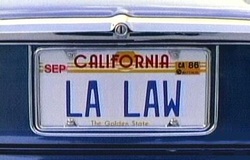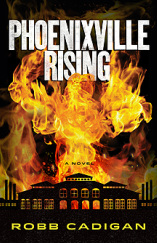
My first real job out of school was as a copyeditor at TV GUIDE. It was a fine job, with friendly people, a convenient location for a kid who didn’t have a car, and an opportunity to use the vast store of pop-culture knowledge taking up valuable space in my brain.
The job also gave me access to piles and piles of scripts and videotapes of the TV shows on the air in 1988.
The more I read and watched, the more I thought: “Hell, I could do this.”
I became obsessed with the idea of writing a TV script of my own. But first I needed to understand the structure of a good script and what made a story work (or not work) on the screen. I took scripts home and, at night in my little almost-condemned apartment, I studied every show I could get my hands on: "thirtysomething," "St. Elsewhere," "21 Jump Street," "Moonlighting" ...
And I started to write scripts of my own. I wrote a "Hill Street Blues," a "Cheers," a "Hooperman" (a great John Ritter show that went away too soon). None of my scripts were any good. But I was learning.
Malcom Gladwell talks about 10,000 hours of practice. This was my practice. My apprenticeship. My grad school.
Finally, using a trial my father had when he was a defense attorney, I wrote a script for "L.A. Law." I created subplots so that all the main characters had something to do. I gave the big stars some potential "Emmy moments." I broke the whole thing into four acts, just the way the other drama scripts did.
It was pretty good. Honestly, I thought it was very good. So I stuck my script into an envelope and sent it right off to Stephen Bochco, creator of “L.A. Law.” No agent, no introduction, no friend of a friend of a friend who worked there. Nothing.
Ah, youth.
A few weeks later, there was a message on my answering machine from one of the producers at Stephen Bochco Productions. Of course, there was. Because that’s how this is all supposed to work, right?
I returned the producer’s call.
We had a long, lovely chat. They liked my script. They liked my script quite a bit, actually. BUT (you knew a “but” was coming), the producer explained, they didn’t buy freelance "spec" scripts. Especially from someone who didn’t live in Hollywood. Someone who had never written a TV script before. Who had no credits to his name. Not even a dog-food commercial.
“Would you consider moving to Los Angeles?” the producer asked.
“Are you offering me a job?”
“Um, no. But you would be closer to the action. You would be part of the industry.” [“The Industry”]
We talked some more. The conversation took on an "off-the-record, here’s the truth, kid” sort of tone. The producer told me his version of "how Hollywood really works."
In truth, he was pretty down on television. And he absolutely hated movies. The staff writer had no real power. Everything was collaboration with people who weren’t as talented as you were, kissing the rear ends of Suits who knew nothing, wasting time playing the game when all you really wanted to do was tell stories. It didn't sound too appealing. Certainly not to a control freak like me.
“Can I give you a piece of advice?” the producer asked me.
“Sure.”
“If you want to control your destiny--if you want your ideas and stories to stand on their own--if you want to be master of your own fate -- YOU REALLY SHOULD WRITE A NOVEL.”
And with that, my 10,000 hours started all over again.
(My debut novel, PHOENIXVILLE RISING, will be released in October 2013.)
The job also gave me access to piles and piles of scripts and videotapes of the TV shows on the air in 1988.
The more I read and watched, the more I thought: “Hell, I could do this.”
I became obsessed with the idea of writing a TV script of my own. But first I needed to understand the structure of a good script and what made a story work (or not work) on the screen. I took scripts home and, at night in my little almost-condemned apartment, I studied every show I could get my hands on: "thirtysomething," "St. Elsewhere," "21 Jump Street," "Moonlighting" ...
And I started to write scripts of my own. I wrote a "Hill Street Blues," a "Cheers," a "Hooperman" (a great John Ritter show that went away too soon). None of my scripts were any good. But I was learning.
Malcom Gladwell talks about 10,000 hours of practice. This was my practice. My apprenticeship. My grad school.
Finally, using a trial my father had when he was a defense attorney, I wrote a script for "L.A. Law." I created subplots so that all the main characters had something to do. I gave the big stars some potential "Emmy moments." I broke the whole thing into four acts, just the way the other drama scripts did.
It was pretty good. Honestly, I thought it was very good. So I stuck my script into an envelope and sent it right off to Stephen Bochco, creator of “L.A. Law.” No agent, no introduction, no friend of a friend of a friend who worked there. Nothing.
Ah, youth.
A few weeks later, there was a message on my answering machine from one of the producers at Stephen Bochco Productions. Of course, there was. Because that’s how this is all supposed to work, right?
I returned the producer’s call.
We had a long, lovely chat. They liked my script. They liked my script quite a bit, actually. BUT (you knew a “but” was coming), the producer explained, they didn’t buy freelance "spec" scripts. Especially from someone who didn’t live in Hollywood. Someone who had never written a TV script before. Who had no credits to his name. Not even a dog-food commercial.
“Would you consider moving to Los Angeles?” the producer asked.
“Are you offering me a job?”
“Um, no. But you would be closer to the action. You would be part of the industry.” [“The Industry”]
We talked some more. The conversation took on an "off-the-record, here’s the truth, kid” sort of tone. The producer told me his version of "how Hollywood really works."
In truth, he was pretty down on television. And he absolutely hated movies. The staff writer had no real power. Everything was collaboration with people who weren’t as talented as you were, kissing the rear ends of Suits who knew nothing, wasting time playing the game when all you really wanted to do was tell stories. It didn't sound too appealing. Certainly not to a control freak like me.
“Can I give you a piece of advice?” the producer asked me.
“Sure.”
“If you want to control your destiny--if you want your ideas and stories to stand on their own--if you want to be master of your own fate -- YOU REALLY SHOULD WRITE A NOVEL.”
And with that, my 10,000 hours started all over again.
(My debut novel, PHOENIXVILLE RISING, will be released in October 2013.)


 RSS Feed
RSS Feed
